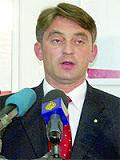SARAJEVO, Bosnia (April 16,2008) – The Bosnian Ministry of Human Rights and Refugees, entity ministries for issues of refugees and displaced persons and the Brcko District joined funds in the amount of 38.800.000 Bosnian Marks for return process in 2008.
The agreement on association and the way of realization of the funds for reconstruction of apartment facilities in this year was adopted and signed in Sarajevo, at a session of Commission for Refugees and Displaced Persons.
President of the Commission for Refugees and Displaced Persons Slavko Marin stated after the session that the agreement will be financially and technically realized through the Return Fund and the Commission will be in charge of the entire return process and will pass the relevant decisions.
In the process of reallocation of funds, it has been planned that 21.800.000 Bosnian Marks is provided for the joint reconstruction of apartment facilities for refugees and displaced persons, which will, according to the current prices at the market, reach the amount of about 1.000 flat units.
Four million Bosnian Marks will be ensured for the completion of CEB Bank’s project completion – the reconstruction of 1.1000 houses. Eight million Bosnian Marks will be invested into reconstruction of apartment units for the persons who used to have the tenant rights.
Five million Bosnian Marks will be ensured for sustainable return. Funds for this year will become operative in the following 30 days.
”This is the first time since 1995 that we have a serious state approach to the issue of returnees and refugees. More than double of the amount of money has been ensured for the return process this year, compared to all the previous years from 2000 until today”, the Bosnian Minister of Human Rights and Refugees Safet Halilovic stated.
He added that 40.000 families have been registered in Bosnia, that is, 136.000 persons who want to return to their homes. Over one billion Bosnian Marks is necessary for sustainable return.
”That is the amount of money that needs to be ensured in the following three years, for without that, there is no Annex 7 realization”, Minister Halilovic emphasized.
.
 PRAGUE, Czech Republic (April 16,2008) – A member of the Bosnian State Presidency Željko Komšić has started his two-day working visit to the Czech Republic and on that occasion, he will meet with Václav Klaus, the President of the Czech Republic.
PRAGUE, Czech Republic (April 16,2008) – A member of the Bosnian State Presidency Željko Komšić has started his two-day working visit to the Czech Republic and on that occasion, he will meet with Václav Klaus, the President of the Czech Republic.